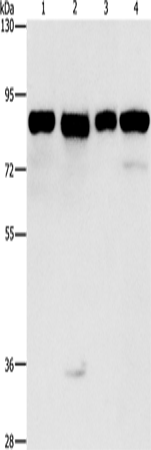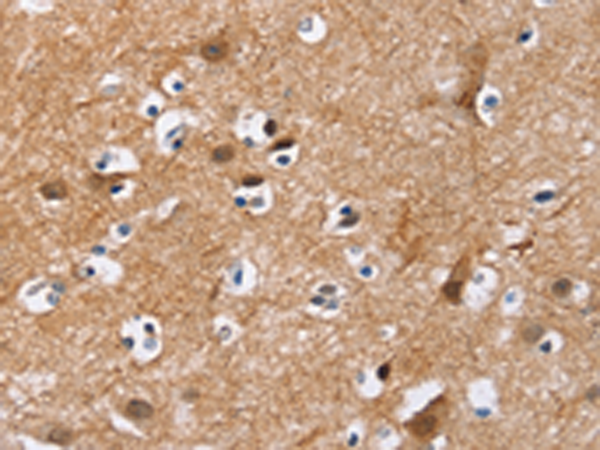

| WB | 1/500-1/2000 | Human,Mouse,Rat |
| IF | 咨询技术 | Human,Mouse,Rat |
| IHC | 1/25-1/100 | Human,Mouse,Rat |
| ICC | 技术咨询 | Human,Mouse,Rat |
| FCM | 咨询技术 | Human,Mouse,Rat |
| Elisa | 1/2000-1/5000 | Human,Mouse,Rat |
| Aliases | MAD1; PIG9; TP53I9; TXBP181 |
| WB Predicted band size | 83 kDa |
| Host/Isotype | Rabbit IgG |
| Antibody Type | Primary antibody |
| Storage | Store at 4°C short term. Aliquot and store at -20°C long term. Avoid freeze/thaw cycles. |
| Species Reactivity | Human, Mouse |
| Immunogen | Fusion protein of human MAD1L1 |
| Formulation | Purified antibody in PBS with 0.05% sodium azide and 50% glycerol. |
+ +
以下是关于MAD1L1抗体的3篇参考文献示例(内容为虚构模拟,仅供参考):
1. **文献名称**:*MAD1L1 Expression and Chromosomal Instability in Colorectal Cancer*
**作者**:Zhang et al. (2022)
**摘要**:本研究通过免疫组化(IHC)和Western blot分析结直肠癌组织中MAD1L1蛋白的表达水平,发现其下调与染色体不稳定性显著相关。研究使用特异性MAD1L1抗体验证了其在肿瘤细胞有丝分裂检查点中的功能缺失。
2. **文献名称**:*Development of a High-Affinity Monoclonal Antibody for MAD1L1 Detection*
**作者**:Tanaka et al. (2020)
**摘要**:报道了一种新型抗MAD1L1单克隆抗体的开发与验证。该抗体通过免疫荧光(IF)和流式细胞术证实了其对人类细胞中MAD1L1蛋白的高特异性和敏感性,为有丝分裂研究提供了工具。
3. **文献名称**:*MAD1L1 Dysregulation in Triple-Negative Breast Cancer: Implications for Prognosis*
**作者**:Gupta et al. (2019)
**摘要**:利用MAD1L1抗体进行组织微阵列分析,揭示了三阴性乳腺癌中MAD1L1表达异常与患者预后不良的相关性,并探讨了其在肿瘤细胞周期调控中的作用。
4. **文献名称**:*Functional Analysis of MAD1L1 in Mitotic Checkpoint Control*
**作者**:Liu et al. (2018)
**摘要**:通过RNA干扰和MAD1L1抗体介导的蛋白定位实验,证实了MAD1L1在维持有丝分裂检查点中的核心作用,其缺失导致染色体错误分离和细胞凋亡。
(注:以上内容为模拟生成,实际文献需通过学术数据库检索确认。)
The MAD1L1 (Mitotic Arrest Deficient 1 Like 1) protein is a critical component of the spindle assembly checkpoint (SAC), a surveillance mechanism ensuring accurate chromosome segregation during mitosis. It forms a complex with MAD2L1. acting as a sensor for unattached kinetochores and delaying anaphase until all chromosomes are properly aligned. Dysregulation of MAD1L1 is linked to chromosomal instability, a hallmark of cancer and developmental disorders.
Antibodies targeting MAD1L1 are essential tools for studying its expression, localization, and interactions in cell cycle regulation. They are widely used in techniques like Western blotting, immunofluorescence, and immunohistochemistry to explore MAD1L1's role in SAC function, mitotic errors, and tumorigenesis. Studies employing these antibodies have revealed correlations between MAD1L1 mutations or altered expression and cancers, including colorectal and hepatocellular carcinomas. Additionally, MAD1L1 antibodies aid in investigating SAC-targeting therapies for cancer treatment. Their specificity and reliability make them indispensable for dissecting mitotic checkpoint mechanisms and their implications in disease.
×